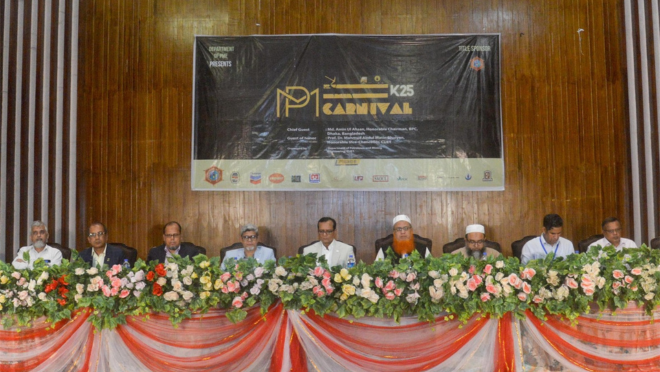Seminar at CUET sparks ambition among future petroleum and mining engineers
Seminar at CUET sparks ambition among future petroleum and mining engineers

In a time of increasing global and national energy demands, the Chittagong University of Engineering and Technology (CUET) is positioning itself as a key player in preparing the next generation of leaders for Bangladesh’s energy sector. This message resonated powerfully today as CUET’s Department of Petroleum and Mining Engineering (PME) hosted a national seminar that brought academia and industry into rare alignment.
Held in CUET’s central auditorium, the seminar served as more than just a discussion platform—it was a clear signal of how academic institutions can act as engines of innovation and practical solutions in the country’s most critical industries, according to a press release.
Addressing the seminar as the chief guest, Md. Amin Ul Ahsan, Chairman of Bangladesh Petroleum Corporation (BPC) and a government secretary, stressed that Bangladesh’s energy security hinges on the petroleum sector. While the nation still relies heavily on imported energy, he emphasized that the focus must now shift to self-reliance and the development of local expertise.
“Chattogram remains at the heart of our petroleum infrastructure,” he said, adding, “and institutions like CUET have an essential role to play in developing the technical minds who will drive this sector forward. We need thinkers, problem-solvers, and visionaries—and we believe CUET is building them.”
In a country where energy transitions are becoming increasingly urgent, the seminar also underscored the need for engineers not only to be technically competent but also capable of addressing complex environmental and economic challenges.
CUET Vice-Chancellor Professor Dr. Mahmud Abdul Matin Bhuiyan, speaking as the Guest of Honor, urged students to expand their vision beyond engineering. “The future belongs to those who can integrate science, innovation, and responsibility. Our goal should be to create professionals who are engineers, researchers, and ethical leaders at once,” he said.
What made the seminar particularly impactful was the presence of top executives from major petroleum companies, including Padma Oil, Eastern Refinery, Jamuna Oil, and Meghna Petroleum. Their participation marked a rare moment of direct dialogue between academic faculty, students, and industry leaders—bringing real-world perspective to classroom theory.
Organized under the leadership of Professor Dr. Abu Sadat Muhammad Sayem, Head of the PME Department, the event aimed to spark more than just academic curiosity. It encouraged industry stakeholders to see CUET as a long-term partner in innovation and talent development. Students gained insights into job prospects, technological trends, and the expectations of employers—effectively transforming the seminar into a launchpad for future careers.
The event was moderated by PME faculty members Assistant Professor Nadia Mahzabeen and Lecturer Md. Zahidul Islam. From the structure of the sessions to the presence of government officials, every aspect of the seminar reflected CUET’s growing ambition to become a national hub for energy research, training, and leadership.
As Bangladesh looks to secure its energy future, CUET is stepping up—not just as an academic institution, but as a partner in progress.


